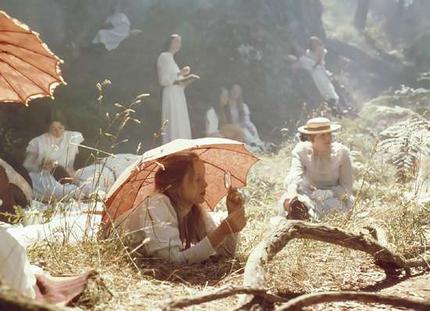
Picnic at Hanging Rock by Peter Weir, 1975
Considered a turning point in Australian film Picnic at Hanging Rock trumpeted the return of Australian cinema after over 20 years of silence.
This film was not Weir's first feature length. The previous year Weir managed to get his film, The Cars That Ate Paris, into the Canne film festival. However, unlike The Cars That Ate Paris, Picnic at Hanging Rock managed to garner respectable success internationally and signalled the beginning of a highly successful directorial career for Peter Weir. That being said, Picnic at Hanging Rock is a film that is rife with problems.
The basic premise of the story is that three girls from Appleyard college and one teacher disappear while enjoying a picnic at Hanging rock. What starts off as cliche seventies horror film spirals off into the slow deteriating effect that this disappearance has on the college and the surrounding community.
A serious consideration in Australian culture has been their close relationship with Britain, stemming from their foundations as a convict colony and following years of being under the mantle of British colonialism. This takes the form of both the ridiculous British facade that is on display at Appleby college, and the wealthy British family that lives nearby complete with the mandatory British spectacled "nincompoop". With the disappearance of the girls this facade of a British upperclass lifestyle slowly but surely crumbles under the unrelating force of their natural surroundings.
The problem is Weir loses focus during the film, and it becomes a meandering mess that can be at times extremely trying to get through. I got the distinct impression that Weir had watched Kubrick's seminal Barry Lyndon several times before embarking on this project. In his own way, Weir manipulated the pacing of the film to try and emulate a more naturalistic movement and lifestyle much in the way Kubrick perfected in his own film. To carry it even further, not unlike how Kubrick had special lenses developed for Barry Lyndon, Weir's cinematographer used stockings stretched over the lense to achieve a particulary soft lighting and texture to the film. However, while Kubrick was able to achieve a visual style that came across astoundingly naturalistic, Weir's film simply cries out that it is trying to hard to be an "Art" film.
Considering the history of the Australian film industry, it is not surprising that Weir tried to hard to impress upon the international community that his film was to be taken seriously, but that however does not change the fact that Picnic at Hanging Rock falls far short of some the classic films Weir would later go on to make like Witness and Dead Poet's Society.
** Two Stars
3 comments:
I'm glad you mentioned that Weir would go forth into greatness. DPS is one of my favorite films and his latest, Master and Commander, was vastly under-rated I thought.
You know, I still haven't seen Master and Commander. But I have seen a fair bit of Weir's films and certainly love his work and respect him as a director.
Really, how can you not love 'DPS'?
Agreed, but you forgot the ridiculous male fantasy aspects of it. My brief assessment.
Post a Comment